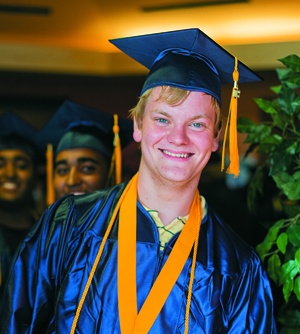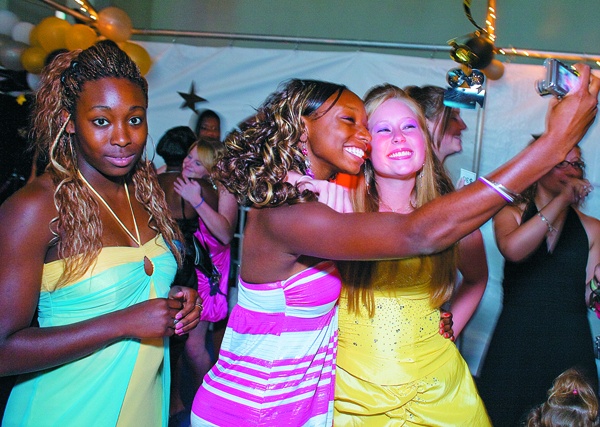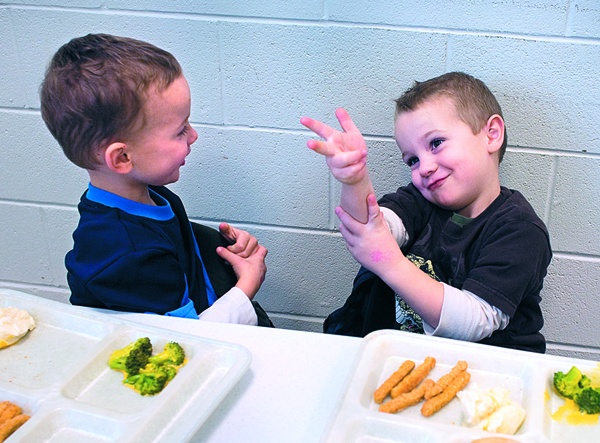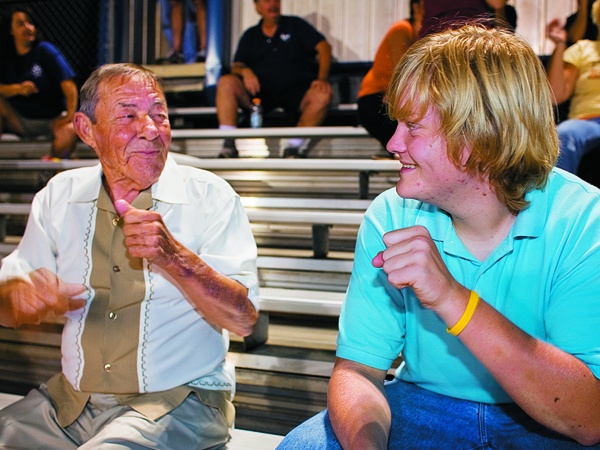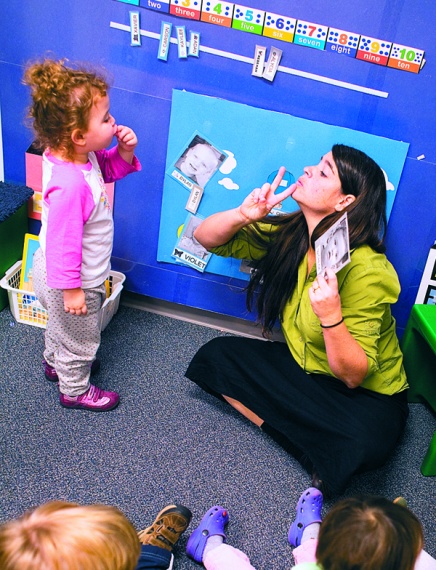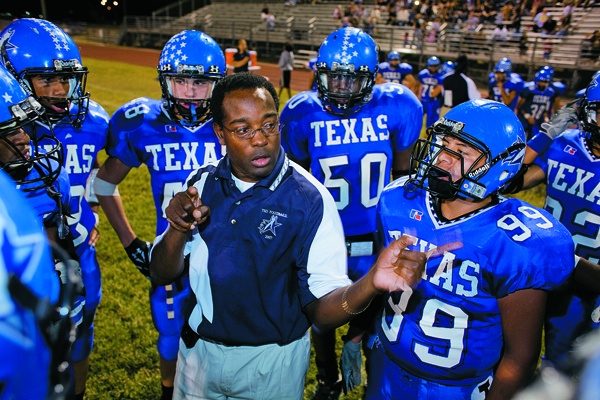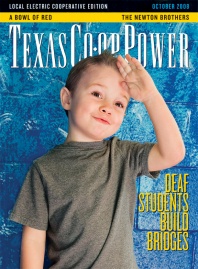Graduation was over, and Charlotte Wilhite couldn’t find her son. Nick Wilhite, valedictorian of his 2008 senior class, had disappeared into the crowd gathered outside R.L. Davis Auditorium on the Texas School for the Deaf campus.
Charlotte, camera bag and video recorder on her shoulder, politely threaded her way through hundreds of people, shaking hands, hugging friends and family members, and greeting person after person on this momentous night. She gushed about her son, who confidently stalked the stage during his valedictory speech. “Isn’t he just amazing? Isn’t he just fantastic?” But still, no sign of Nick.
Then she saw him. Nick Wilhite, who once longed for friends, was now surrounded by them. A bevy of well-wishers, classmates and close friends crowded around him, all trying to touch him, talk to him. Still wearing his blue graduation gown, gold valedictorian medal and thousand-watt smile, Nick’s hands happily flew as he signed conversation after conversation.
Even TSD Superintendent Claire Bugen had to wait her turn. “I’m in line to hug the celebrity,” she said, teasingly telling Nick that he had her “crazy worried” when he initially had threatened not to give a graduation speech.
But Wilhite, who graduated first in a class of 64 and challenged his classmates to pursue collegiate success, ultimately decided he had plenty to say. “It’s time for us to walk across that bridge that’s been made into a new tomorrow,” he told his fellow seniors in sign language, striding across the stage and punctuating his point with outstretched hands. Wilhite, who took off his cap and gown to deliver his speech, moved freely about the stage, sometimes even pointing at the audience to drive his message home as an interpreter voiced his words.
Wilhite quoted Leonardo da Vinci: “Simplicity is the ultimate sophistication.” With a wicked grin on his face, Wilhite then promised to keep his speech short and challenged the speakers taking the stage after him to do the same.
Applause and laughter welled up from the standing-room-only crowd. Throughout the night, hearing and deaf members of the audience applauded the graduates by both clapping their hands and waving them in the air—the traditional form of applause in deaf culture. At times, the clapping was so loud it sounded like running water.
If anyone knows about crossing bridges, it’s Wilhite, who transferred to TSD as a junior, moving to Austin from Arlington where he attended a mainstream public school as a sophomore. A straight-A student, Wilhite never worried about his grades. But as the school’s only deaf student, he couldn’t communicate with his peers. He struggled to make friends and said he often sat alone before school or between classes. And Wilhite felt frustrated in the classroom, where instead of communicating directly with the teacher he had to rely on interpreters.
“I’d go to chemistry and sit there and just watch the interpreter and that’s it,” said Wilhite, now a freshman studying architecture at the University of Texas at Arlington. “In woodworking class, I would work by myself. There was no way to chat with other people. There’s no fun and interaction in that.”
With his eyes on the interpreter, “I’d miss what other students asked,” Wilhite said. “When I’d get home, I’d read the chapter again, what the teacher had already gone over in the classroom. I’d have to read it and say, ‘Oh, this is what that meant.’ ”
So Wilhite told his parents that he wanted to move to Austin and attend TSD, where deaf and hard-of-hearing students are, well, just typical kids.
TSD, the state’s oldest continuously operating publicly funded school, founded in 1856, serves about 10 percent of Texas’ estimated 4,800 deaf students in its on-campus programs and an additional 20 percent in its summer and short-term programs. TSD, a state agency, also serves all of Texas through outreach programs such as workshops, distance learning, family weekend retreats, sign language classes and interpreter training.
At TSD, students from birth through the age of 22 are “coming into an environment where they have access to total 24-hour communication,” Bugen said.
TSD students can communicate with anyone, at any time, through American Sign Language (ASL). With language barriers destroyed, TSD students find themselves empowered in a new world, said Wess Smith, the school’s sign language and assessment coordinator.
“You look at the kid who’s the little wallflower in the public school, and they come here and they’re our head cheerleader and our valedictorian,” he said. “You look at the kid who gets teased on the playground, and they come here and end up being student body government president.”
The loneliness many deaf students experience in mainstream schools vanishes at TSD, where students walk and talk in twos and threes across campus. They laugh when everyone else is laughing, grasp the full context of conversations without needing an interpreter and merrily interrupt their friends in the middle of rowdy conversations in the cafeteria.
They cheer at athletic events, both verbally and by waving their hands, and go wild at the homecoming pep rally as cheerleaders take their cue from a small bass drum.
In the classroom, they raise their hands and compete to be the first to answer a teacher’s question, always conversing in ASL.
There’s a special sense of belonging on TSD’s campus where students immerse themselves in a world that includes deaf role models: 55 percent and 65 percent, respectively, of the teaching and residential staffs are deaf.
One of those role models is Marlene Etkie, a teacher in the parent-infant program and fifth- and sixth-grade girls volleyball coach. “I don’t like to feel left out, and here you don’t feel left out,” Etkie said. “Everyone has equal access to communication, equal opportunities for their wants, desires. You can depend on yourself—you don’t have to depend on someone else.”
Nick Wilhite certainly found independence, especially in interactions with his peers. Charlotte Wilhite said her son didn’t “have to go through adults to talk to kids in an imperfect way. He was able to do it his own way, perfectly.”
And now Wilhite, the architecture student, is building yet another bridge.
——————–
Camille Wheeler is staff writer for Texas Co-op Power.
